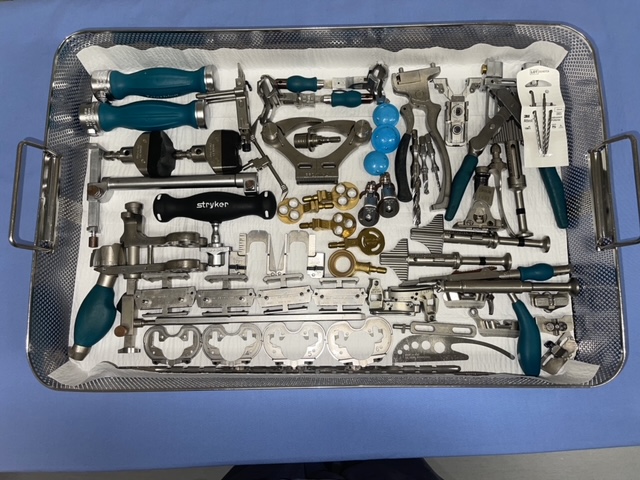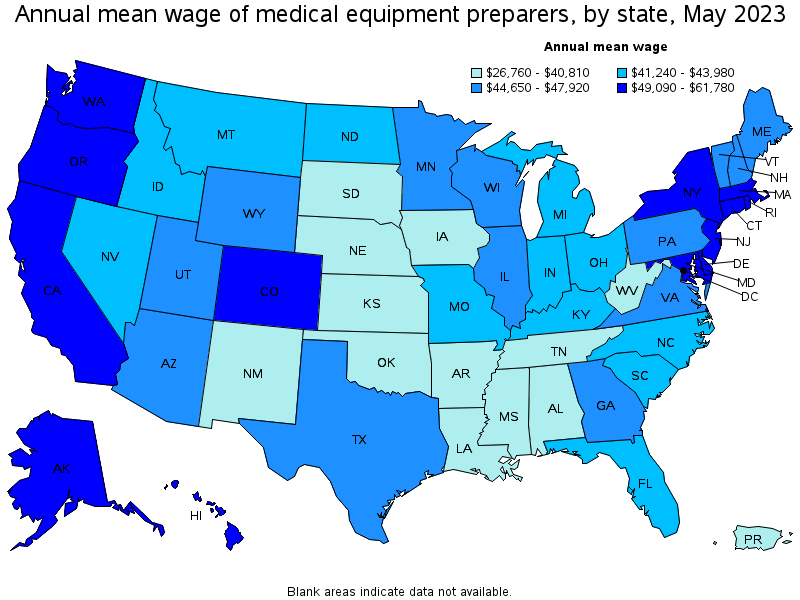
Start Your
Sterile Processing Career Today!
MasterPlus™ Program.

Gain Experience
through Clinical Training Today!
Externship Site

Enhance Skills with our Cutting-Edge VR Tech !

Ace Your SPT Exam with our Certification Prep Toolkit

Ace your CBSPD or CRCST exams with SteriBoost.
Start now and succeed!

Stay Informed with
SteriBoost News
Your Guide to a Sterile Processing Technician Career
Welcome to Blue Oak Institute’s comprehensive guide to a career as a Sterile Processing Technician (SPT). Whether you’re just starting to explore this rewarding field or looking for detailed information to help you take the next steps, you’ve come to the right place. This guide covers everything you need to know, from job responsibilities to certification requirements.
What is a Sterile Processing Technician?
A Sterile Processing Technician is a healthcare professional responsible for the decontamination, sterilization, and preparation of surgical instruments and medical equipment. They play a critical role in preventing infections and ensuring patient safety. SPTs work behind the scenes to ensure that all surgical tools are clean, sterile, and ready for use in various medical procedures
Sterile Processing Technicians (SPTs) are known by various titles depending on their job specifics and work environment. Here is a comprehensive list of the different names and roles associated with sterile processing technicians:
- Certified Registered Central Service Technician (CRCST): Often used in hospitals, this title is certified by the Healthcare Sterile Processing Association (HSPA) and focuses on central service duties.
- Certified Sterile Processing and Distribution Technician (CSPDT): Common in both hospitals and surgical centers, this role includes decontamination, sterilization, and distribution of medical instruments. This designated title is certified by Certification Board for Sterile Processing & Distribution (CBSPD).
- Central Sterile Processing Technician: Similar to SPD Tech, but often emphasizes the central sterilization department in larger hospitals.
- Sterilization Technician: This title is frequently used in various medical and dental offices, focusing on the sterilization process.
- Central Service Technician: Used interchangeably with CRCST, highlighting central service duties in healthcare facilities.
- Medical Equipment Preparer: A broader term that can encompass those who prepare and sterilize medical equipment in various healthcare settings. It is a term used mostly by government agency such as the US Department of Labor.
- Central Sterile Supply Technician (CSS Tech): This role is specific to the supply and maintenance of sterile equipment in hospital settings.
- Instrument Technician: Often found in surgical centers, focusing on the preparation and maintenance of surgical instruments.
- Decontamination Technician: Specializes in the cleaning and decontamination process of medical instruments.
- Materiel Management Technician: Involves inventory control and the maintenance of medical supplies and equipment.
- Surgical Instrument Processor: A specific role focusing on processing and preparing surgical instruments for procedures.
- Clinical Sterile Processing Technician: Found in clinical settings, focusing on sterilization and processing within a clinic environment.
- Sterile Processing Specialist: A broader term that can include specialized roles within the sterile processing field, often indicating a higher level of expertise or specific duties.
- Sterile Processing Coordinator: Typically a supervisory or managerial role within the sterile processing department, overseeing operations and staff.
These various titles reflect the diverse settings and specific duties of sterile processing professionals across the healthcare industry. Each role emphasizes different aspects of sterile processing, from decontamination to inventory management, ensuring that medical and surgical equipment is safe and ready for use.

Where Can Sterile Processing Technicians Find Work?
Sterile Processing Technicians can find employment in various healthcare settings, including:
- Hospitals: Most SPTs work in hospital central sterile supply departments.
- Surgery Centers: Ambulatory surgical centers also require skilled SPTs.
- Dental Offices: Some dental practices employ SPTs to handle their sterilization needs.
- Veterinary Clinics: Animal hospitals and veterinary clinics need SPTs to sterilize instruments used in animal surgeries.
What Hours Does a Sterile Processing Technician Work?
The work hours for a Sterile Processing Technician can vary based on the employer and setting. Typical work hours include:
- Full-Time: Many SPTs work full-time, 40-hour weeks, often in shifts to cover 24/7 operations in hospitals.
- Part-Time: Part-time positions are also available, providing flexibility for those balancing other commitments.
- Shifts: SPTs may work day, evening, or night shifts, including weekends and holidays, to ensure continuous operation of the sterilization process.
Steps to Becoming a Sterile Processing Technician
- Complete High School or GED: To begin as sterile processing tech one needs a high school diploma or GED. With this a person is eligible to sit for the certification board exam.
- Apply to a Sterile Processing Technician Training Program: The next step would be to apply to the SteriBoost MasterPlus Program which offers either a self-paced or instructor-led sterile processing tech certification course.
- Get Certified: After completing all of the course modules and passing the final exam, certificate earners apply to sit for the board exam with either HSPA or CBSPD
- Apply for Jobs: Start applying for positions in various healthcare settings
Apply to a Sterile Processing Technician Training Program

Why Get Your Sterile Processing Technician Certification?
Certification validates your knowledge and skills, making you a more competitive job candidate. It can also lead to higher salaries and better job opportunities. Certified SPTs are often preferred by employers and may have more opportunities for advancement.
HSPA Certification Requirements
The Healthcare Sterile Processing Association (HSPA) offers the Certified Registered Central Service Technician (CRCST) certification. Requirements include:
- Training: Completion of a training program or equivalent work experience.
- Exam: Passing the CRCST exam, which tests knowledge in decontamination, sterilization, and instrumentation.
- Continuing Education: Certified individuals must complete continuing education to maintain their certification.
Certification Board for Sterile Processing and Distribution Requirements
The Certification Board for Sterile Processing and Distribution (CBSPD) offers various certifications, including the Certified Sterile Processing and Distribution Technician (CSPDT). Requirements include:
- Training: Completion of an approved training program or equivalent work experience.
- Exam: Passing the CSPDT exam, which covers all aspects of sterile processing.
- Recertification: Ongoing education and recertification are required to maintain credentials.
Sterile Processing Technician Salary Overview
National estimates for Medical Equipment Preparers:
Employment estimate and mean wage estimates for Medical Equipment Preparers:
| Employment | Employment RSE | Mean hourly wage | Mean annual wage | Wage RSE |
|---|---|---|---|---|
| 66,790 | 0.8 % | $ 22.79 | $ 47,410 | 0.4 % |
Percentile wage estimates for Medical Equipment Preparers:
| Percentile | 10% | 25% | 50% (Median) | 75% | 90% |
|---|---|---|---|---|---|
| Hourly Wage | $ 16.36 | $ 18.30 | $ 21.77 | $ 25.63 | $ 30.76 |
| Annual Wage | $ 34,020 | $ 38,060 | $ 45,280 | $ 53,310 | $ 63,980 |
Industry profile for Medical Equipment Preparers:
Industries with the highest published employment and wages for Medical Equipment Preparers are provided.
Industries with the highest levels of employment in Medical Equipment Preparers:
| Industry | Employment | Percent of industry employment | Hourly mean wage | Annual mean wage |
|---|---|---|---|---|
| General Medical and Surgical Hospitals | 46,330 | 0.81 | $ 23.05 | $ 47,940 |
| Offices of Dentists | 5,010 | 0.49 | $ 17.32 | $ 36,020 |
| Outpatient Care Centers | 4,140 | 0.39 | $ 25.91 | $ 53,890 |
| Offices of Physicians | 3,350 | 0.12 | $ 23.87 | $ 49,650 |
| Employment Services | 1,980 | 0.05 | $ 21.24 | $ 44,180 |
Industries with the highest concentration of employment in Medical Equipment Preparers:
| Industry | Employment | Percent of industry employment | Hourly mean wage | Annual mean wage |
|---|---|---|---|---|
| General Medical and Surgical Hospitals | 46,330 | 0.81 | $ 23.05 | $ 47,940 |
| Offices of Dentists | 5,010 | 0.49 | $ 17.32 | $ 36,020 |
| Outpatient Care Centers | 4,140 | 0.39 | $ 25.91 | $ 53,890 |
| Specialty (except Psychiatric and Substance Abuse) Hospitals | 800 | 0.28 | $ 26.59 | $ 55,300 |
| Other Ambulatory Health Care Services | 590 | 0.17 | $ 22.17 | $ 46,110 |
Top paying industries for Medical Equipment Preparers:
| Industry | Employment | Percent of industry employment | Hourly mean wage | Annual mean wage |
|---|---|---|---|---|
| Management of Companies and Enterprises | 90 | <.005% industry employment | $ 35.54 | $ 73,910 |
| Management, Scientific, and Technical Consulting Services | Estimate not released | Estimate not released | $ 30.55 | $ 63,530 |
| Local Government, excluding Schools and Hospitals (OEWS Designation) | 50 | <.005% industry employment | $ 27.36 | $ 56,910 |
| Specialty (except Psychiatric and Substance Abuse) Hospitals | 800 | 0.28 | $ 26.59 | $ 55,300 |
| Outpatient Care Centers | 4,140 | 0.39 | $ 25.91 | $ 53,890 |
Geographic profile for Medical Equipment Preparers:

States with the highest employment level in Medical Equipment Preparers:
| State | Employment | Employment per thousand jobs | Location quotient | Hourly mean wage | Annual mean wage |
|---|---|---|---|---|---|
| California | 7,750 | 0.43 | 0.98 | $ 29.70 | $ 61,780 |
| New York | 4,740 | 0.50 | 1.15 | $ 24.66 | $ 51,290 |
| Texas | 3,750 | 0.28 | 0.63 | $ 22.05 | $ 45,870 |
| Florida | 3,570 | 0.37 | 0.85 | $ 20.28 | $ 42,190 |
| Ohio | 2,630 | 0.48 | 1.09 | $ 20.36 | $ 42,340 |

Top paying states for Medical Equipment Preparers:
| State | Employment | Employment per thousand jobs | Location quotient | Hourly mean wage | Annual mean wage |
|---|---|---|---|---|---|
| California | 7,750 | 0.43 | 0.98 | $ 29.70 | $ 61,780 |
| District of Columbia | 210 | 0.30 | 0.67 | $ 28.28 | $ 58,830 |
| Alaska | 150 | 0.49 | 1.11 | $ 26.44 | $ 55,000 |
| New Jersey | 2,270 | 0.54 | 1.23 | $ 25.23 | $ 52,480 |
| Delaware | 240 | 0.52 | 1.18 | $ 25.22 | $ 52,450 |
Comparison with Sterile Processing Department (SPD) Manager Salaries
In comparison, Sterile Processing Department (SPD) Managers typically earn significantly higher salaries due to their advanced responsibilities and leadership roles. The average salary for an SPD Manager in the United States is around $70,000 to $85,000 per year. Experienced managers in larger facilities or metropolitan areas can earn over $100,000 annually. This salary range reflects the increased duties, including overseeing staff, managing departmental budgets, ensuring compliance with health and safety regulations, and optimizing sterilization processes.
Job Outlook for Sterile Processing Technicians
The job outlook for Sterile Processing Technicians is exceptionally promising, marking it as one of the fastest-growing careers in the healthcare sector. According to the U.S. Department of Labor, the employment of medical equipment preparers, including Sterile Processing Technicians, is projected to grow by 10% from 2022 to 2032. This growth rate significantly outpaces the average for all occupations.
As of recent estimates, there are approximately 39,000 job positions available for Sterile Processing Technicians across the United States. This demand is driven by several key factors:
- Aging Population: The increasing number of older adults who require medical procedures boosts the demand for surgical instruments and, consequently, for skilled professionals to sterilize and prepare these instruments.
- Advancements in Medical Technology: Continuous development of new surgical procedures and technologies necessitates meticulous sterilization processes to prevent infections and ensure patient safety.
- Infection Control Awareness: Heightened awareness and stringent regulations regarding infection control in healthcare settings drive the need for certified Sterile Processing Technicians. Given this promising job outlook, now is an excellent time to pursue a career as a Sterile Processing Technician.
By joining SteriBoost, you can take advantage of our top-tier training programs and resources to ensure a successful entry into this rapidly expanding field.
